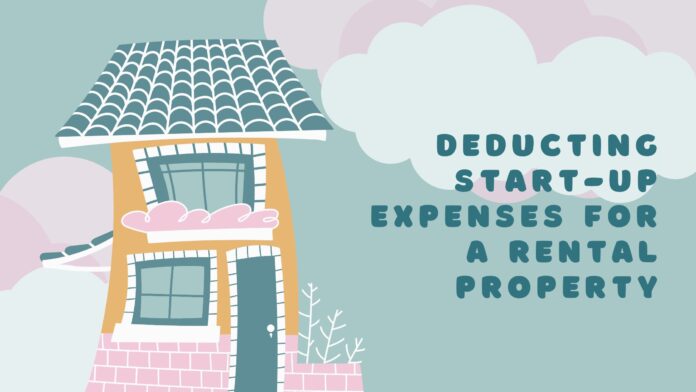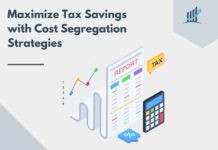Unlock Start-Up Expense Savings
Interested in becoming a commercial or residential landlord?
You’ll likely have to shell out plenty of money before you ever collect a dime in rent.
But the good news is that some expenses that you would otherwise think of as non-deductible are start-up expenses that end up on your tax return as tax deductions.
What Are Start-Up Expenses?
“Start-up expenses” are certain costs you incur before a new business begins. In the case of a rental property business, these are costs incurred before you offer the property for rent.
Unlike operating expenses for an existing business, start-up expenses can’t automatically be deducted in a single year because the money you spend to start a new rental (or any other) business is a capital expense—a cost that will benefit you for more than one year.
Normally, you can’t deduct these types of expenses until you sell or otherwise dispose of the business. But a special tax rule allows you to deduct up to
$5,000 in start-up expenses the first year you are in business, and then deduct the remainder (if any) over the next 15 years.
Start-up expenses are those that would be deductible if incurred by an active trade or business. There are two broad categories: investigatory expenses and preopening costs.
Investigatory expenses are deductible as start-up costs where they are incurred as part of a general search to determine whether to acquire or enter a new business and which new business to enter. For example, you may deduct fees paid to a market research firm to analyze the demographics, traffic patterns, and general economic conditions of a neighborhood.
But once a specific business is identified as the target, expenses incurred to acquire it are not deductible as start-up expenses.
Common preopening costs for rental property owners include
- outside office expenses paid before a rental business begins—for example, office rent, telephone service, utilities, office supplies, and office equipment rental;
- home office expenses;
- insurance premiums (but not title insurance);
- maintenance costs for a rental property paid before the property is offered for rent—for example, landscaping and utilities (but not the cost of connecting utilities);
- costs for recruiting and training employees before the business opens—for example, hiring and training an apartment or building manager;
- costs to create and set up a website;
- advertising costs;
- business licenses, permits, and other fees; and
- fees paid to lawyers, accountants, consultants, and others for professional services—but legal and other fees paid to purchase a rental property are not start-up expenses, nor are costs to form a business entity such as an LLC, as we explain below.
Costs That Are Not Start-Up Expenses
Some costs related to opening a rental business are not considered start-up expenses. Many of these costs are still deductible, but different rules apply to them.
Real Property and Other Long-Term Assets
Real property and other long-term assets you purchase for your rental business that will last for more than one year are not considered part of your start-up costs.
This category includes the property you buy with the intention to rent and any long-term personal property you purchase for your rental property, such as appliances, carpeting, furniture, or lawnmowers. It also includes any long-term property you buy to run your business, such as computers, office furniture and equipment, and cars and other vehicles. These items are capital assets, and their costs are capital expenses.
You must depreciate the cost of this property over its useful life—39 years for non-residential real property, 27.5 years for residential real property, or five or seven years for most personal property. (In the case of personal property, you have the option of deducting the cost in one year under Section 179 and/or using bonus depreciation.)
But you can’t take depreciation deductions until your property is placed in service—for example, you can’t begin to depreciate a rental building until you make it available for rent.
Ordinarily, the largest single expense that you can’t deduct as a start-up expense is the cost of your rental property. For tax purposes, the cost of the rental property includes not just the purchase price, but expenses related to the purchase, including
- bidding costs, application fees, and similar expenses;
- costs to appraise or otherwise determine the property’s value;
- architectural, engineering, environmental, geological, or inspection services for the property—for example, termite inspection fees;
- expenses for preparing or reviewing the property’s acquisition documents, such as bids, offers, sales agreements, or purchase contracts;
- costs to negotiate the purchase terms or structure, including tax advice;
- expenses for evaluating and examining the property’s title—for example, abstract fees and attorneys’ fees;
- costs to obtain regulatory approval or secure permits;
- property conveyance costs, including sales and transfer taxes and title registration costs;
- finders’ fees and brokers’ commissions, including amounts contingent on the successful closing of the purchase; and
- the cost of services provided by a qualified intermediary in a like-kind exchange.
You can’t deduct any of these expenses as start-up expenses. Instead, you add these costs to the rental property’s basis (the property’s value for tax purposes) and then depreciate the portion of the basis allocated to depreciable assets such as the building and personal property.
Real Property Improvements
The costs of improvements you make to the rental property are not start-up or operating expenses. Instead, these costs are capital expenses that you must depreciate.
The costs of any repairs you make to a rental property before the business begins are start-up expenses, and those repairs made after the business begins are operating expenses.
Travel Expenses
Travel expenses to get your rental business going are deductible start-up expenses, with one important exception: travel costs to buy the targeted rental property are not start-up expenses. Instead, they are capital expenses that must be added to the cost of the property and depreciated.
Interest and Taxes
You can’t deduct interest on a rental property mortgage (or any other interest) or real estate taxes as start-up expenses. You can deduct these costs as you pay them once your real estate business begins.
Organizational Costs
Costs you pay to form a partnership, limited liability company, or corporation are not part of your start-up costs. But under a different rule, you can deduct up to $5,000 of these costs the first year you’re in business and any amount remaining over the first 180 months you are in business. If the organization costs exceed $50,000, you reduce the immediate up-to-$5,000 deduction dollar for dollar and add the disallowed amounts to the 180-month amortization.
How to Deduct Start-Up Expenses
On the day you start your rental business, you can elect to deduct your start-up expenses.
The deduction is equal to
- the lesser of your start-up expenditures or $5,000, reduced (but not below zero) by the amount by which such start-up expenditures exceed $50,000, plus
- amortization of the remaining start-up expenses over the 180-month period beginning with the month in which the rental property business begins.
Example. You incur $53,000 in start-up expenses before October 5—the day you put your property on the rental market. For your first year, your start-up deduction is
- $2,000 ($5,000 less the $3,000 in excess of $50,000), plus
- $850 (3 months’ amortization of $51,000 ÷ 180).
If you have $55,000 or more in start-up expenses, you get no immediate deduction. You deduct the whole amount over a period of 180 months.
To make the election, you simply claim the start-up costs as “Other expenses” on your Schedule E (or another appropriate return).
You don’t have to specifically identify the deducted amounts as start-up expenditures for the election to be effective. But if you have more than $5,000 in start-up expenses, you must complete and attach IRS Form 4562 to your return for the first tax year you are in business.
If you don’t want to currently deduct your start-up expenses, you can forgo the deemed election by clearly capitalizing your start-up expenses instead. You must do this on your return for the tax year in which your rental business begins. The election not to deduct start-up expenses is irrevocable. If you do this, your start-up costs become part of the tax basis of your rental business.
Expanding an Existing Rental Business
The cost of expanding an existing business is a business operating expense, not a start-up expense. As long as business expansion costs are ordinary and necessary, they are currently deductible.
But your expenses will be currently deductible only if the expansion involves an activity that is within the compass of your existing rental business. In other words, it must be part of the normal expansion of your business.
The IRS and tax court have taken a narrow view of what constitutes an existing rental business. They have held that a landlord’s rental business exists only in the geographic area where the property is located. So, a landlord who buys (or seeks to buy) property in a different area is starting a new rental business, which means the expenses for expanding in the new location are start-up expenses.
In one case, for example, the tax court held that a husband and wife who owned several rental properties in North Carolina started a new rental business (as opposed to expanding their existing rental business) when they purchased a rental house in Richmond, Virginia.
Investors Can’t Deduct Start-Up Expenses
You can deduct your rental property start-up expenses if your rental qualifies as a business. Investors cannot deduct start-up expenses. Fortunately, most rental activities qualify as businesses.
Takeaways
Start-up expenses are certain costs you incur before a new business begins. In the case of a rental property business, these are costs incurred before you offer the property for rent. Unlike operating expenses for an existing business, start-up expenses can’t automatically be deducted in a single year, because the money you spend to start a new rental (or any other) business is a capital expense.
Up to $5,000 in start-up expenses is deductible immediately upon start-up, with any remaining expenses deductible over a period of 180 months (starting immediately). The tax code reduces the immediate $5,000 deduction dollar for dollar for start-up expenses in excess of $50,000.
Start-up expenses are those that would be deductible if incurred by an active trade or business. There are two broad categories: (1) investigatory expenses and (2) preopening costs such as advertising, office expenses, salaries, insurance, and maintenance costs.
The cost of purchasing a rental property is not a start-up expense. Rental property and other long-term assets such as furniture must be depreciated once the rental business begins.
The start-up expense limitation applies to starting a new rental business. It does not apply to expanding an existing rental business in the same geographic area. Business expansion expenses produce immediate deductions.










